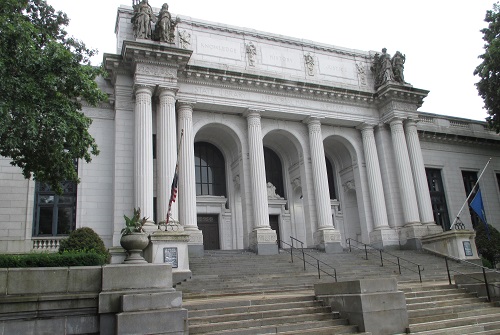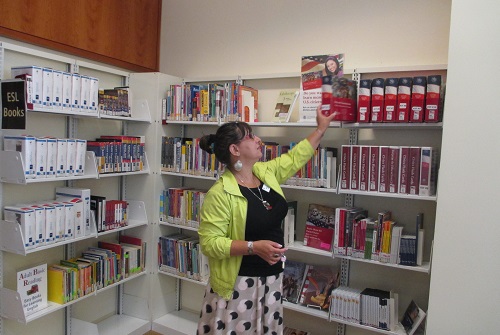Blog Posts | August 16, 2016
Share ThisBy Teri DeVoe
IMLS Senior Program Officer
State libraries are a critical partner for the Grants to States program, and given the size of the annual awards they receive through IMLS, we make it a priority to visit each of them in person every five years. My recent site visit to Connecticut offered a glimpse at one state library’s approach to its services, stewardship of federal funds, and role in seeding innovation throughout the state.

Connecticut State Library in Hartford
One of the most consistent applications of Library Services and Technology Act (LSTA) funds is towards the network of libraries cooperating with the National Library Service for the Blind and Physically Handicapped. Connecticut’s Library for the Blind and Physically Handicapped (LBPH) is a shining example and is currently adapting to serve users in new ways. It has tracked the circulation of materials over time, which show how digital book usage has grown compared to diminishing requests for the older cassette format. The LBPH recently launched its first online survey, which revealed the impact these services have for users. When asked whether the LBPH improves their quality of life, 73% strongly agreed, and 23% agreed (with the remainder having no opinion). Metrics like this help us understand where funds are really making a difference.
Connecticut State Library offers a range of other federally-funded projects with similar impact. Its deliverIT CT service, which enables 215 libraries to share collections on a daily basis, is estimated to save $9 million in postage each year. The statewide Service Center lends many types of materials to libraries, including book discussion sets, children’s and youth collections used heavily in schools, maker kits, and even puppets. Connecticut is now working to build a shared catalog and an eBook platform that will build from earlier IMLS-funded tools (Georgia Public Library Service’s Evergreen and New York Public Library’s SimplyE). As the State Library Administrative Agency, we hold them to a high standard of legal compliance, administration, and fiscal accountability, and our site visit is the chance to dive more deeply into processes. One of my biggest takeaways from this visit was the level of transparency with which Connecticut administers federal funds, even posting their LSTA manual online.

The citizenship corner at Ferguson Library
For years Connecticut has also made subawards with IMLS funding, and I enjoyed seeing some of these projects in person. Ferguson Library in Stamford, for example, offered classes and collections as part of its “American Citizenship and Beyond” grant. At the time of our visit six people had recently become citizens, demonstrating that libraries do, indeed, change lives. Ferguson has discussed partnering with Hartford Public Library, which is known nationally for its services to new Americans. Some of its work in this arena was also seeded with IMLS funds, and a few permanent staff even came onboard with earlier IMLS grants. As we passed the counseling rooms where Hartford patrons meet with immigration attorneys, they offered a sneak preview of things to come. With an onsite kitchen as one of their “creative spaces,” they’ll soon be training new Americans for the restaurant industry.
These highlights show the tangible impact that federal funds are having in communities throughout the state. It will be another five years until we meet up with Connecticut on their home turf, and it’s exciting to imagine where they will go from here.
Teri DeVoe is a senior program officer within the Office of Library Services at IMLS. She can be reached at tdevoe@imls.gov.
